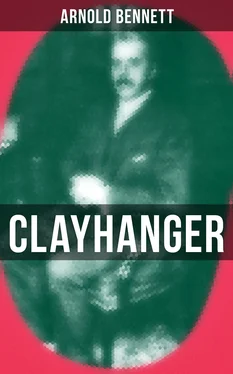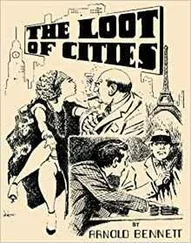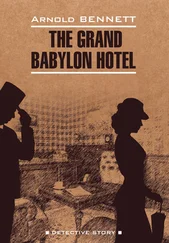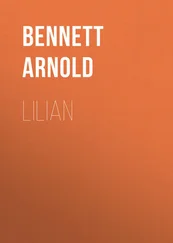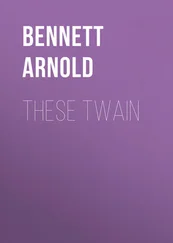Besides, he would have stayed in any case. His mind was elevated above the fear of consequences.
There was some concertina-playing, with a realistic imitation of church bells borne on the wind from a distance; and then the Bursley Prize Handbell Ringers (or Campanologists) produced a whole family of real bells from under a form, and the ostler and the two women arranged a special table, and the campanologists fixed their bells on it and themselves round it, and performed a selection of Scotch and Irish airs, without once deceiving themselves as to the precise note which a chosen bell would emit when duly shaken.
Singular as was this feat, it was far less so than a young man’s performance of the ophicleide, a serpentine instrument that coiled round and about its player, and when breathed into persuasively gave forth prodigious brassy sounds that resembled the night-noises of beasts of prey. This item roused the Indian god from his umbilical contemplations, and as the young ophicleide player, somewhat breathless, passed down the room with his brazen creature in his arms, Mr Enoch Peake pulled him by the jacket-tail.
“Eh!” said Mr Enoch Peake. “Is that the ophicleide as thy father used to play at th’ owd church?”
“Yes, Mr Peake,” said the young man, with bright respect.
Mr Peake dropped his eyes again, and when the young man had gone, he murmured, to his stomach—
“I well knowed it were th’ ophicleide as his father used to play at th’ owd church!” And suddenly starting up, he continued hoarsely, “Gentlemen all, Mr James Yarlett will now kindly oblige with ‘The Miller of the Dee.’” And one of the women relighted his pipe and served him with beer.
Big James’s rendering of “The Miller of the Dee” had been renowned in the Five Towns since 1852. It was classical, hallowed. It was the only possible rendering of “The Miller of the Dee.” If the greatest bass in the world had come incognito to Bursley and sung “The Miller of the Dee,” people would have said, “Ah! But ye should hear Big James sing it!” It suited Big James. The sentiments of the song were his sentiments; he expressed them with natural simplicity; but at the same time they underwent a certain refinement at his hands; for even when he sang at his loudest Big James was refined, natty, and restrained. His instinctive gentlemanliness was invincible and all-pervading. And the real beauty and enormous power of his magnificent voice saved him by its mere distinction from the charge of being finicking. The simple sound of the voice gave pleasure. And the simple production of that sound was Big James’s deepest joy. Amid all the expected loud applause the giant looked naively for Edwin’s boyish mad enthusiasm, and felt it; and was thrilled, and very glad that he had brought Edwin. As for Edwin, Edwin was humbled that he should have been so blind to what Big James was. He had always regarded Big James as a dull, decent, somewhat peculiar fellow in a dirty apron, who was his father’s foreman. He had actually talked once to Big James of the wonderful way in which Maggie and Clara sang, and Big James had been properly respectful. But the singing of Maggie and Clara was less than nothing, the crudest amateurism, compared to these public performances of Big James’s. Even the accompanying concertina was far more cleverly handled than the Clayhanger piano had ever been handled. Yes, Edwin was humbled. And he had a great wish to be able to do something brilliantly himself—he knew not what. The intoxication of the desire for glory was upon him as he sat amid those shirt-sleeved men, near the brooding Indian god, under a crawling bluish canopy of smoke, gazing absently at the legend: “As a bird is known by its note—”
After an interval, during which Mr Enoch Peake was roused more than once, a man with a Lancashire accent recited a poem entitled “The Patent Hairbrushing Machine,” the rotary hairbrush being at that time an exceedingly piquant novelty that had only been heard of in the barbers’ shops of the Five Towns, though travellers to Manchester could boast that they had sat under it. As the principle of the new machine was easily grasped, and the sensations induced by it easily imagined, the recitation had a success which was indicated by slappings of thighs and great blowings-off of mirth. But Mr Enoch Peake preserved his tranquillity throughout it, and immediately it was over he announced with haste—
“Gentlemen all, Miss Florence Simcox—or shall us say Mrs Offlow, wife of the gentleman who has just obliged—the champion female clog-dancer of the Midlands, will now oblige.”
These words put every man whom they surprised into a state of unusual animation; and they surprised most of the company. It may be doubted whether a female clog-dancer had ever footed it in Bursley. Several public-houses possessed local champions—of a street, of a village—but these were emphatically not women. Enoch Peake had arranged this daring item in the course of his afternoon’s business at Cocknage Gardens, Mr Offlow being an expert in ratting terriers, and Mrs Offlow happening to be on a tour with her husband through the realms of her championship, a tour which mingled the varying advantages derivable from terriers, recitations, and clogs. The affair was therefore respectable beyond cavil.
Nevertheless when Florence shone suddenly at the service-door, the shortness of her red-and-black velvet skirts, and the undeniable complete visibility of her rounded calves produced an uneasy and agreeable impression that Enoch Peake, for a chairman of the Mutual Burial Club, had gone rather far, superbly far, and that his moral ascendancy over Louisa Loggerheads must indeed be truly astonishing. Louisa now stood gravely behind the dancer, in the shadow of the doorway, and the contrast between her and Florence was in every way striking enough to prove what a wonderful and mysterious man Enoch Peake was. Florence was accustomed to audiences. She was a pretty, doll-like woman, if inclined to amplitude; but the smile between those shaking golden ringlets had neither the modesty nor the false modesty nor the docility that Bursley was accustomed to think proper to the face of woman. It could have stared down any man in the place, except perhaps Mr Peake.
The gestures of Mr Offlow, and her gestures, as he arranged and prepared the surface of the little square dancing-board that was her throne, showed that he was the husband of Florence Simcox rather than she the wife of Offlow the reciter and dog-fancier. Further, it was his role to play the concertina to her: he had had to learn the concertina— possibly a secret humiliation for one whose judgement in terriers was not excelled in many public-houses.
She danced; and the service-doorway showed a vista of open-mouthed scullions. There was no sound in the room, save the concertina and the champion clogs. Every eye was fixed on those clogs; even the little eyes of Mr Peake quitted the button of his waistcoat and burned like diamond points on those clogs. Florence herself chiefly gazed on those clogs, but occasionally her nonchalant petulant gaze would wander up and down her bare arms and across her bosom. At intervals, with her ringed fingers she would lift the short skirt—a nothing, an imperceptibility, half an inch, with glance downcast; and the effect was profound, recondite, inexplicable. Her style was not that of a male dog-dancer, but it was indubitably clog-dancing, full of marvels to the connoisseur, and to the profane naught but a highly complicated series of wooden noises. Florence’s face began to perspire. Then the concertina ceased playing, so that an undistracted attention might be given to the supremely difficult final figures of the dance.
Читать дальше
